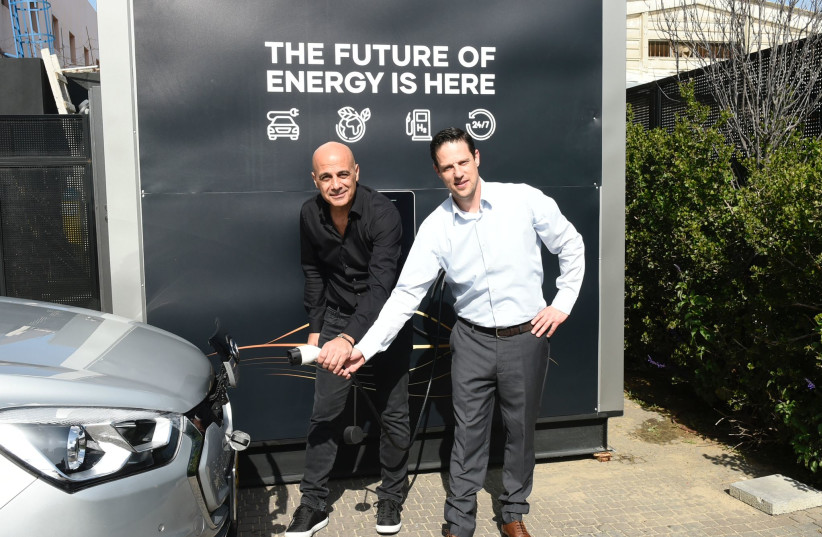Global telecommunications giant Vodafone has deployed an Israeli-developed zero- emission fuel cell technology in Romania as part of a pilot project aimed at powering remote cell towers.
For more stories from The Media Line go to themedialine.org
The British-based firm operating in 21 countries partnered with GenCell, an Israeli company, as well as Romanian solar tech pioneer Simtel. Together, they successfully tested an off-grid power solution at a rural mobile site in Romania.
Known as the GenCell FOX alkaline fuel cell, the innovative technology generates electricity using liquid ammonia, an energy-dense and carbon-free hydrogen carrier. The only byproducts of power generation are water, nitrogen and heat.
GenCell, which is headquartered in the central Israel city of Petah Tikva, believes that ammonia could transform the world of energy.
“The world is moving to distributed energy; instead of having the big central power plants, the world is moving toward microgrids,” Shelli Zargary, GenCell’s marketing content and strategy manager, told The Media Line. “In microgrids you can use fuel cells to complete batteries and to keep your batteries charged all the time.”

A fuel cell is a device that generates electricity via an electrochemical reaction. Alkaline fuel cells, which consume hydrogen and pure oxygen, have been used for decades to generate power for everything from NASA satellites and space capsules, to power backups for communication towers and even boats. They are relatively expensive, however, due to their reliance on precious metals like platinum.
Traditional hydrogen fuel cells also are not as energy-efficient as their ammonia-based counterparts, according to Zargary.
“Ammonia is the second-most commonly used chemical compound in the world,” she said. “The world produces 280 million tons of ammonia every year and it’s primarily used for fertilizers, but also for refrigerants and semi-conductors.”
“Our ammonia cracker is very efficient and 84% of the hydrogen that’s produced is released to use as fuel, while only 17% is used to run the process.”
Shelli Zargary
What is the difference between hydrogen and ammonia?
There are other key differences between hydrogen and ammonia fuel cells, according to GenCell CEO Rami Reshef.
“In comparison to hydrogen, liquid ammonia has a higher energy density and is easier to transport and store,” Reshef told The Media Line. “It could enable a full year’s fuel supply to be stored on-site, reducing the number of site visits to remote locations.” In addition, he added, unlike the methanol used in standard hydrogen fuel cells, liquid
ammonia is carbon-free and does not produce greenhouse gas emissions.
GenCell’s FOX system was specifically designed to be used in remote locations and comes equipped with built-in sensors for leaks.
A tank of ammonia is run into the ammonia cracker, where the hydrogen is then extracted and put into the fuel cell to produce power. A single 12-ton tank of ammonia provides enough fuel for up to a year of 24/7 operation.
Vodafone’s field test lasted for six weeks and showed that the ammonia-based fuel cell was reliable and able to supply a consistent power output over that period.
Zargary said that no other company has managed to commercialize the same kind of technology.
“The value of that is that we get a very reliable, weather-resistant method of producing energy for places where otherwise using a generator creates a lot of greenhouse gases,” she said. “That’s why it’s very relevant to use this technology for cell towers in remote locations.”
Although the FOX cell does not emit greenhouse gases, producing industrial ammonia itself is reliant on fossil fuels. For this reason, the Israeli firm is presently in the midst of developing so-called “green ammonia,” which would be achieved via a 100% carbon-neutral process.
Aside from the telecom and utilities sectors, the battery-charging sector also is likely to rely on fuel cells in the near future, especially for the growing electric vehicles (EVs) market. As more and more EVs take to the road, there is not enough energy in power grids to keep them charged.
To that end, GenCell recently reached an agreement with EV Motors, one of Israel’s key EV importers, and is expected to deploy dozens of fuel cell stations across the country in the near future.
Vodafone also is looking to other forms of clean tech as it moves to reduce its carbon footprint, including solar wind and micro-turbine technologies.
“Now that the test is complete [Vodafone] has committed to showcasing it at all the sites and we are in discussions with them about where they plan to use it,” Zargary said.
